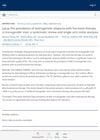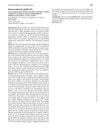 January 2018 in “Springer eBooks”
January 2018 in “Springer eBooks” Gender affects hair and scalp characteristics, with differences in hormone responses, graying patterns, and trace metals.
 December 2024 in “Research Journal of Pharmacy and Technology”
December 2024 in “Research Journal of Pharmacy and Technology” Androgenic alopecia is mainly caused by DHT, and new treatments focus on hair regeneration and aging factors.
 September 2023 in “Cureus”
September 2023 in “Cureus” Topical finasteride might be a good alternative for hair loss treatment with fewer side effects, but more research is needed.
 1 citations,
January 2015 in “Hair therapy & transplantation”
1 citations,
January 2015 in “Hair therapy & transplantation” Some supplements and hormones can increase hair loss by raising DHT levels.
 77 citations,
June 2015 in “Nature Reviews Urology”
77 citations,
June 2015 in “Nature Reviews Urology” Some common medications can harm male fertility, but many effects can be reversed.
 2 citations,
September 2014 in “Journal of The American Academy of Dermatology”
2 citations,
September 2014 in “Journal of The American Academy of Dermatology” Obesity may worsen hair loss in men and increase hirsutism in overweight or obese individuals, with weight loss recommended for treatment.
29 citations,
November 1975 in “Clinics in endocrinology and metabolism” Testosterone is made by Leydig cells, is active when not bound to proteins, and works by binding to receptors in muscles and other tissues.
59 citations,
January 1976 in “Vitamins and hormones” Prostate cells have proteins that bind to specific hormones, which can increase protein production when activated by these hormones.
 100 citations,
July 2004 in “The Journal of Sexual Medicine”
100 citations,
July 2004 in “The Journal of Sexual Medicine” Hormones like estrogen, testosterone, progesterone, and prolactin play complex roles in female sexual function, with testosterone potentially improving sexual desire, arousal, and satisfaction. However, more research is needed to establish safe and effective hormone treatments for female sexual dysfunction.
 September 2024 in “Research Square (Research Square)”
September 2024 in “Research Square (Research Square)” Many North African women with acne also have PCOS, showing more severe symptoms and higher testosterone levels.
 57 citations,
January 2004 in “Journal of Endocrinology”
57 citations,
January 2004 in “Journal of Endocrinology” Baldness caused by male hormones in female-to-male transsexuals doesn't increase the risk of heart disease.
 May 2023 in “Animal Reproduction Update”
May 2023 in “Animal Reproduction Update” High levels of cortisol in hair show long-term stress which can lower fertility in animals.
 6 citations,
January 2016 in “Evidence-based complementary and alternative medicine”
6 citations,
January 2016 in “Evidence-based complementary and alternative medicine” Saw palmetto supplements may reduce prostate cancer cell growth without being toxic.
 55 citations,
July 1999 in “Clinics in Sports Medicine”
55 citations,
July 1999 in “Clinics in Sports Medicine” Athletes use steroids to enhance performance despite health risks and legal issues, and education on their dangers is needed.
1 citations,
January 2015 in “Elsevier eBooks” Certain pesticides and fungicides can interfere with male hormone functions, potentially causing reproductive issues in male rats.
1 citations,
November 2007 in “Neuro-chirurgie/Neurochirurgie” Cyproterone acetate is a safe treatment that causes modest feminization in transgender female adolescents, and works better with added estrogens.
 3 citations,
October 2020 in “Bladder cancer”
3 citations,
October 2020 in “Bladder cancer” 5α-reductase inhibitors don't stop bladder cancer from developing or getting worse.
 December 2023 in “Journal of family medicine and primary care”
December 2023 in “Journal of family medicine and primary care” Hair loss in Saudi Arabia causes a low psychosocial impact, with less effect on those without a family history of hair loss.
 May 2023 in “Journal of Ethnopharmacology”
May 2023 in “Journal of Ethnopharmacology” The wild garlic plant, Allium macrostemon Bunge, can promote hair growth and could potentially be used to treat hair loss.
35 citations,
October 2011 in “Medicine and science in sports and exercise” Muscles can make their own androgens, which may help muscle growth.
 16 citations,
October 2007 in “Andrologia”
16 citations,
October 2007 in “Andrologia” DHT is a strong androgen that may pose less risk to the prostate compared to testosterone.
 August 2023 in “Journal of Clinical Medicine”
August 2023 in “Journal of Clinical Medicine” Metformin lowers prolactin in women without PCOS but not in those with PCOS, where it reduces other hormones instead.
1 citations,
August 2021 in “Arhivʺ vnutrennej mediciny” Hormonal imbalances can cause hair loss, and understanding them can help develop better treatments.
 September 2024 in “Journal of the American Academy of Dermatology”
September 2024 in “Journal of the American Academy of Dermatology” Many transgender men on testosterone therapy experience hair loss.
 70 citations,
March 2016 in “Urologic Clinics of North America”
70 citations,
March 2016 in “Urologic Clinics of North America” The document explains how the male reproductive system works, its role in making testosterone, and how conditions like obesity can disrupt it, leading to low testosterone and fertility issues.
 23 citations,
October 2015 in “Andrology”
23 citations,
October 2015 in “Andrology” New male hormonal contraceptives show promise but need more research on long-term effects and funding for larger trials.
 1 citations,
November 1995 in “Postgraduate medical journal”
1 citations,
November 1995 in “Postgraduate medical journal” A Saudi individual initially identified as a girl had a genetic disorder affecting gender development.
 1 citations,
October 2022 in “Adolescent Health, Medicine and Therapeutics”
1 citations,
October 2022 in “Adolescent Health, Medicine and Therapeutics” Gender-affirming therapy can cause skin issues like acne and hair loss in transgender adolescents, and more research is needed on its dermatological effects.
 October 2023 in “Annales Academiae Medicae Silesiensis”
October 2023 in “Annales Academiae Medicae Silesiensis” Saw palmetto extracts might help treat male hair loss and need more research.
 March 2024 in “The journal of sexual medicine”
March 2024 in “The journal of sexual medicine” The therapies improved ejaculation disorders and sexual function in middle-aged men.
























